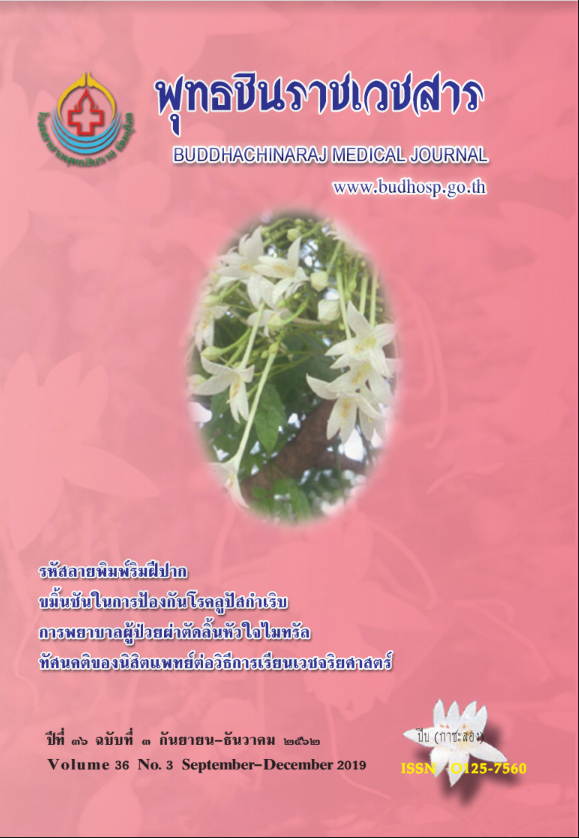ประสิทธิผลและความปลอดภัยของขมิ้นชันในการป้องกันโรคลูปัสกำเริบ ในผู้ป่วยที่ต้องหยุดยาคลอโรควินหรือไฮดรอกซีคลอโรควิน
ประสิทธิผลและความปลอดภัยของขมิ้นชันในการป้องกันโรคลูปัสกำเริบ
คำสำคัญ:
ขมิ้นชัน, การป้องกันโรคลูปัสกำเริบ, ผู้ป่วยที่ต้องหยุดยาคลอโรควินหรือไฮดรอกซีคลอโรควินบทคัดย่อ
โรคลูปัสเป็นโรคภูมิต้านทานตนเองทำลายเนื้อเยื่อตัวเอง ยาคลอโรควินหรือไฮดรอกซีคลอโรควินหรือยา
ต้านอักเสบต่าง ๆ ได้ถูกนำมาใช้รักษาขณะพบการอักเสบ โดยหลังจากโรคสงบจะลดและหยุดยาต้านอักเสบต่าง ๆ
เหลือไว้เพียงยาคลอโรควินหรือไฮดรอกซีคลอโรควินเพื่อป้องกันโรคกำเริบ ปัญหาหลักของยาคลอโรควินและ
ไฮดรอกซีคลอโรควินคือทำให้เกิดจุดรับภาพและจอประสาทตาเสื่อมซึ่งเกี่ยวข้องกับขนาดสะสมของยาทำให้ต้อง
หยุดการใช้ยาดังกล่าว มีหลักฐานที่แสดงว่าขมิ้นชันมีผลต่อระบบภูมิคุ้มกันในโรคลูปัสคล้ายกับไฮดรอกซีคลอโรควิน
แต่ยังไม่ได้นำมาใช้เพื่อป้องกันโรคกำเริบ การศึกษานี้มีวัตถุประสงค์เพื่อประเมินประสิทธิผลและความปลอดภัย
ของขมิ้นชันในการป้องกันโรคลูปัสกำเริบในผู้ป่วยที่ต้องหยุดยาทั้งสองชนิดนี้ในโรงพยาบาลพุทธชินราช พิษณุโลก
29 คนที่อาการของโรคคงที่อย่างน้อย 3 เดือน ศึกษาแบบปิดสองทางโดยการสุ่มและมีกลุ่มควบคุม ประเมินโรคทุก
12 สัปดาห์ สุ่มผู้ป่วยเป็นสองกลุ่มโดยใช้ขมิ้นชัน 750 มก.ต่อวันนาน 52 สัปดาห์เทียบกับยาหลอก ผลลัพธ์หลัก
โดยวัดการเพิ่มขึ้นของค่า SLEDAI ผลลัพธ์รองโดยวัดจำนวนของผู้ป่วยที่โรคกำเริบรุนแรง, ต้องเพิ่มขนาดของยา
เพรดนิโซโลนเป็นสองเท่าหรือมากกว่า 0.5 มก.ต่อน้ำหนักตัว1 กก. ต่อวัน, ต้องเข้ารับการรักษาในโรงพยาบาล
ด้วยโรคลูปัส หรือต้องเพิ่มยากดภูมิ ผลการศึกษาพบว่ากลุ่มขมิ้นชันเกิดโรคกำเริบน้อยกว่ากลุ่มยาหลอก
อย่างมีนัยสำคัญทางสถิติ ขมิ้นชันป้องกันการเกิดโรคกำเริบเล็กน้อยถึงปานกลางได้ 1.8 เท่า ป้องกันการเกิดโรคกำเริบ
รุนแรงได้ 1.6 เท่าได้อย่างปลอดภัย โดยกลุ่มขมิ้นชันมีโอกาสรอดจากภาวะวิกฤตสูงกว่ากลุ่มยาหลอก 2 เท่า
(24/12 สัปดาห์) จึงเป็นความหวังใหม่ของแพทย์ในการดูแลผู้ป่วยกลุ่มนี้ที่นับวันจะมีจำนวนมากขึ้น ลดความกังวล
ของผู้ป่วยที่ต้องหยุดยาคลอโรควินหรือไฮดรอกซีคลอโรควิน รวมทั้งควรศึกษาประสิทธิภาพและผลข้างเคียงของ
ขมิ้นชันในระยะยาวในผู้ป่วยจำนวนมากต่อไป
เอกสารอ้างอิง
2. Gensous N, Marti A, Barnetche T, Blanco P, Lazaro E, Seneschal J, et al. Predictive biological markers of systemic lupus erythematosus flares: a systematic literature review. Arthritis Res Ther 2017;19(1):1442-6.
3. Petri M, Genovese M, Engle E, Hochberg M. Definition, incidence, and clinical description of flare in systemic lupus erythematosus. A prospective cohort study. Arthritis Rheum 1991;34(8):937-44.
4. Kakati S, Teronpi R, Barman B. Frequency, pattern, and determinants of flare in systemic lupus erythematosus: A study from North East India. Egypt Rheumatol 2015;37(4):S55-9.
5. Mirzayan MJ, Schmidt RE, Witte T. Prognostic parameters for flare in systemiclupus erythematosus. Rheumatology 2000;39(12):1316-9.
6. Nikpour M, Urowitz MB, Iba ez D, Gladman DD. Frequency and determinants of flare and persistently active disease in systemic lupus erythematosus. Arthritis Rheum 2009;61(9):1152-8.
7. Silva JC, Mariz HA, Rocha LF Jr, Oliveira PS, Dantas AT, Duarte AL, et al. Hydroxychloroquine decreases Th17 -related cytokines in systemic lupus erythematosus and rheumatoid arthritis patients. Clinics (Sao Paulo) 2013;68(6):766-71.
8. Willis R, Seif AM, McWin G Jr, Martinez-Martinez LA, Gonzalez EB, Dang N, et al. Effect of hydroxychloroquine treatment on pro-inflammatory cytokines and disease activityin SLE patients: data from LUMINA (LXXV), a multiethnic US cohort. Lupus 2012;21(8):830-5.
9. The Canadian Hydroxychloroquine Study Group. A randomized study of the effect of withdrawing hydroxychloroquine sulfate in systemic lupus erythematosus. N Engl J Med 1991;324(3):150-4.
10. Tsakonas E, Joseph L, Esdaile JM, Choquette D, Senecal JL, Cividino A, et al. A long-term study of hydroxychloroquine withdrawal on exacerbations in systemic lupus erythematosus. The Canadian Hydroxychloroquine Study Group. Lupus 1998;7(2):80-5.
11. Meinao IM, Sato EI, Andrade LE, Ferraz MB, Atra E. Controlled trial with chloroquinediphosphate in systemic lupus erythematosus. Lupus 1996;5(Suppl 1):s41-s44.
12. Ruiz-Irastorza G, Egurbide MV, PijoanJ I, Garmendia M, Villar J, Martinez-Berriotxoa A, et al. Effects of antimalarials on thrombosis and survival in patients with systemic lupus erythematosus. Lupus 2006;15(9):577-83.
13. Pons-Estel GJ, Alarcon GS, McGwin G. Jr, Danila MI, Zhang J, Bastian HM, et al. Protective effect of hydroxychloroquine on renal damage in patients with lupus nephritis: data from LUMINA, a multiethnic U.S. cohort. Arthritis Rheum 2009;61(6):830-9.
14. Parikh SV, Rovin BH. Current and Emerging Therapies for Lupus Nephritis. J Am Soc Nephrol 2016;27(10):2929-39.
15. Marmor MF, Kellner U, Lai TY, Lyons JS, Mieler WF. American Academy of Ophthalmology. Revised recommendations on screening for chloroquine and hydroxychloroquine retinopathy. Ophthalmology 2011;118(2):415-22.
16. Meiler WF. New monitoring guidelines for hydroxychloroquine. Presented at Retina Subspecialty Day, 2010 Oct 10, Chicago.
17. Ruther K, Foerster J, Berndt S, Schroeter J. Chloroquine/hydroxychloroquine: variability of retinotoxic cumulative doses. Ophthalmology 2007;104(10):875-9.
18. Ruiz-Irastorza G, Ramos-Casals M, Brito-Zeron P, Khamashta MA. Clinical efficacy and side effects of antimalarials in systemic lupus erythematosus: a systematic review. Ann Rheum Dis 2010;69(1):20-8.
19. Aggarwal BB, Kumar A, Bharti AC. Anticancer potential of curcumin: preclinical and clinical studies. Anticancer Res 2003;23(1A):363-98.
20. Jurenka JS. Anti-inflammatory properties of curcumin, a major constituent of Curcuma longa: a review of preclinical and clinical research. Altern Med Rev 2009;14(2):141-53.
21. Momtazi-Borojeni AA, Haftcheshmeh SM, Esmaeili SA, Johnston TP, Abdollahi E, Sahebkar A. Curcumin: A natural modulator of immune cells in systemic lupus erythematosus. Autoimmun Rev 2018;17(2):125-35.
22. Lee H, Kim H, Lee G, Chung HS, Bae H. Curcumin attenuates lupus nephritis upon interaction with regulatory T cells in New Zealand Black/White mice. Br J Nutr 2013;110(1):69-76.
23. Khajehdehi P, Zanjaninejad B, Aflaki E, Nazarinia M, Azad F, Malekmakan L, et al. Oral supplementation of turmeric decreases proteinuria, hematuria, and systolic blood pressure in patients suffering from relapsing or refractory lupus nephritis: a randomized and placebo-controlled study. J Ren Nutr 2012;22(1):50-7.
24. Tan EM, Cohen AS, Fries JF, Masi AT, McShane DJ, Rothfield NF, et al. The 1982 revised criteria for the classification of systemic lupus erythematosus. Arthritis Rheum 1982;25(11):1271-7.
25. Lam GKW, Petri M. Assessment of systemic lupus erythematosus. Clin Exp Rheumatol 2005;23(5 Suppl 39):S120-32.
26. Ngamjarusn C, Chongsuvivatwon V, Mc Nei E. 4 Studies: sample size calculation for an epidemiological study on a smart device. Siriraj Med J 2016;68(3):160-70.






